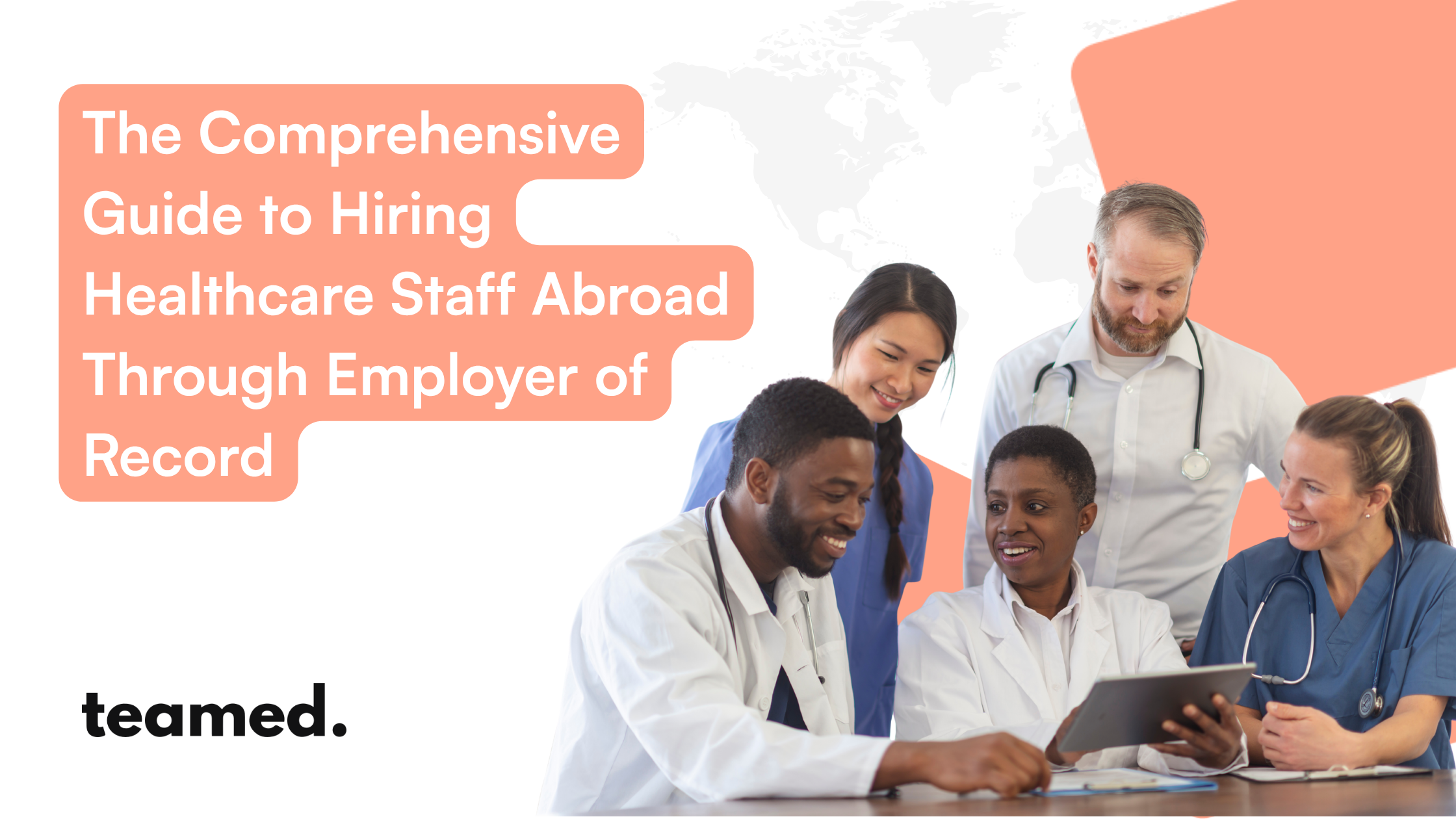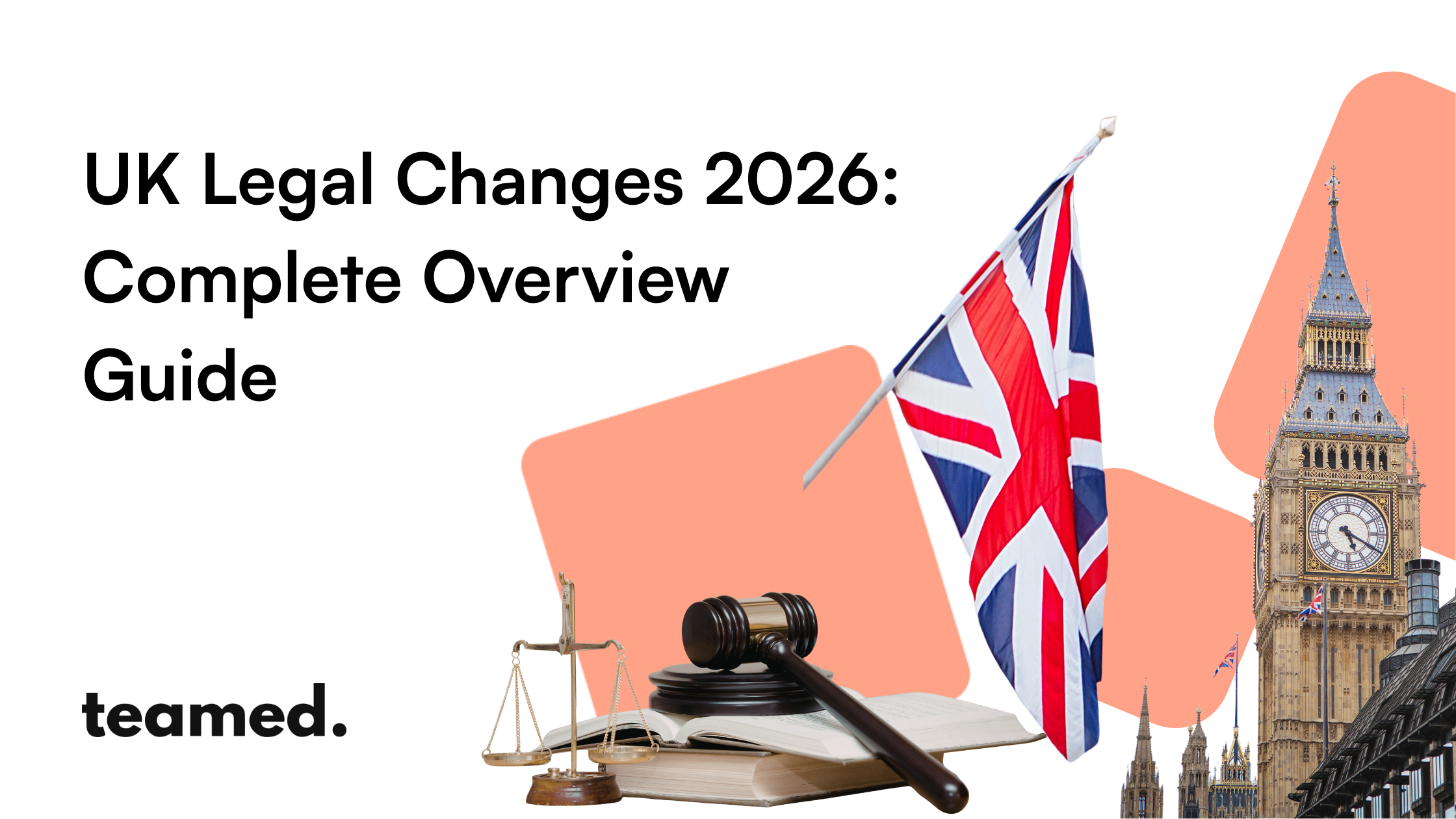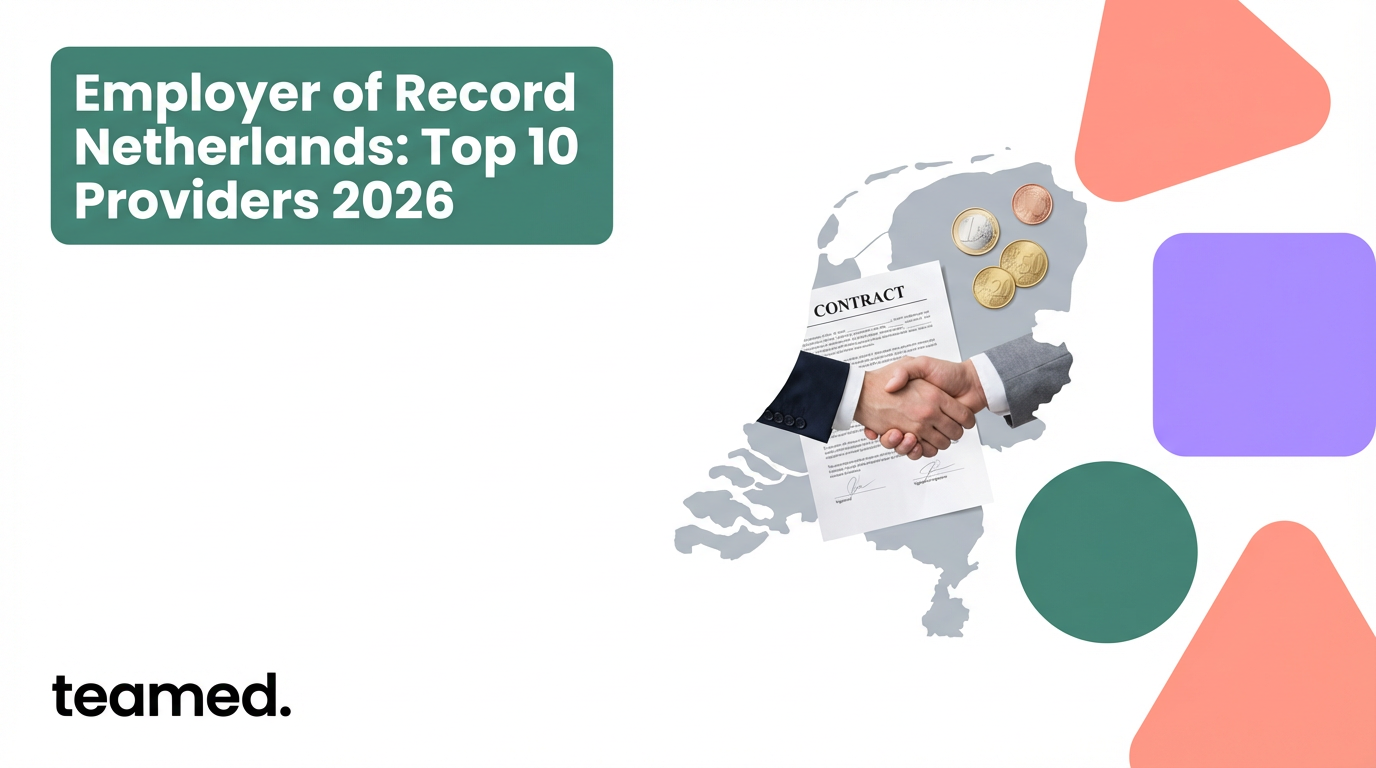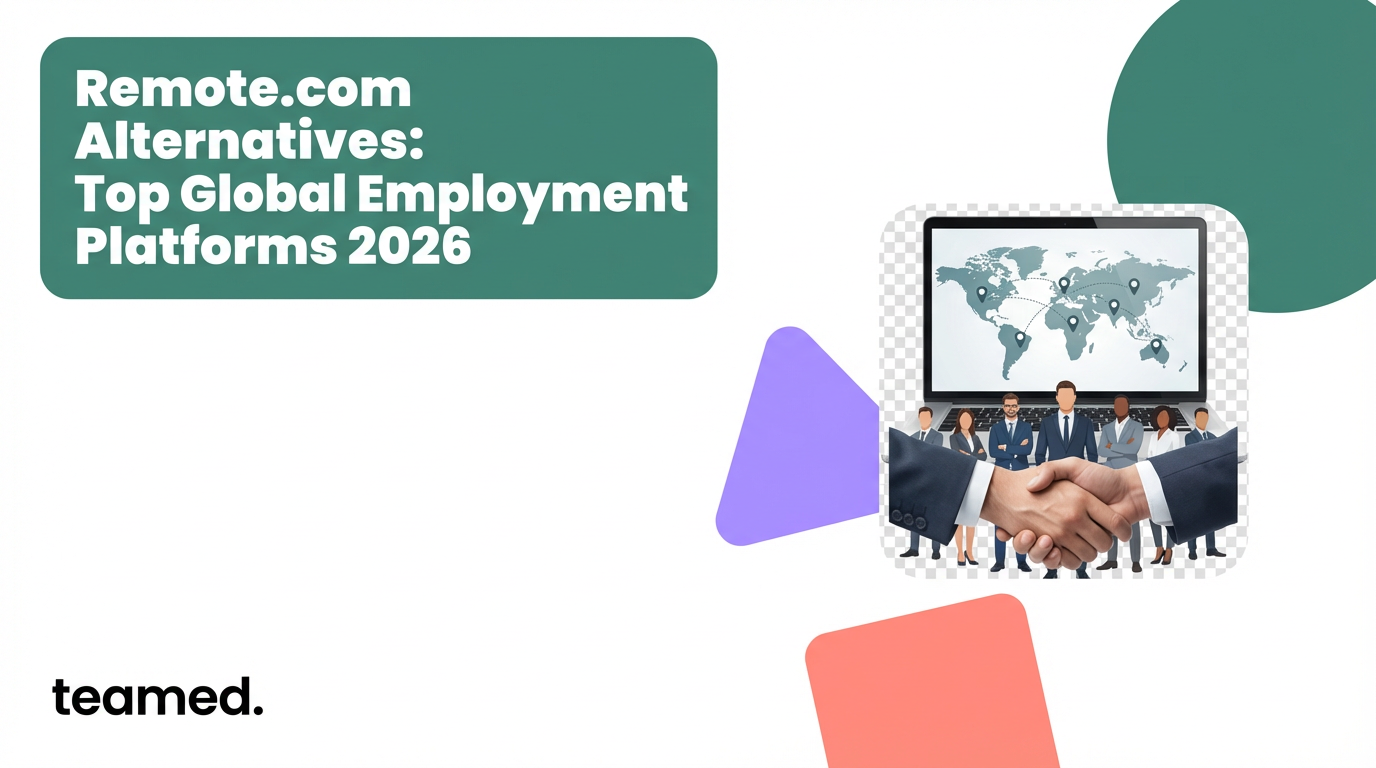The Comprehensive Guide to Hiring Healthcare Staff Abroad Through Employer of Record
Specialist nurses in Warsaw, radiologists in Madrid, clinical research associates across five European countries. The talent your healthcare organisation needs doesn't respect borders. Yet hiring internationally typically means months of entity setup, £30,000 in legal fees, and compliance risk that keeps Legal awake at night.
An Employer of Record eliminates that friction entirely by becoming the legal employer in the staff member's home country while you retain complete control over their clinical work. The global EOR market valued at USD 4.7 billion in 2025 reflects this growing demand for streamlined international hiring. This guide covers how EORs handle medical licensing, professional indemnity, patient data protection, and the step-by-step process to hire healthcare staff abroad in 24 hours.
Key Takeaways
- An Employer of Record legally employs your medical staff in their home country, handling contracts, payroll, and compliance while you direct their clinical work
- Healthcare organisations hire scarce global talent in 24 hours without setting up foreign entities or navigating complex local regulations
- EORs manage healthcare-specific compliance including medical licensing, professional indemnity insurance, and patient data protection requirements
- Built-in AI Agents automate 70% of payroll and credential verification while in-country experts handle regulatory edge cases
- Fair and transparent pricing starts at £400 per employee monthly with no surprise fees for tax filings or regulatory changes
Understanding an Employer of Record in Healthcare
An Employer of Record becomes the legal employer for your medical staff in their home country. They take on full employment responsibility while you retain complete control over clinical duties and day-to-day management.
The EOR appears as the employer on all official documents (contracts, tax filings, statutory registrations). They absorb the legal liability that comes with international employment. For your organisation, this means hiring a specialist nurse in Portugal or a radiologist in Poland without registering a legal entity or understanding local tax codes.
The EOR drafts locally compliant contracts, runs payroll in the correct currency , withholds appropriate taxes, and keeps employment practices aligned with both general labour standards and healthcare-specific regulations. You manage the employee's clinical work: shifts, protocols, performance reviews, patient care. The administrative burden and compliance risk transfer entirely to the EOR.
Why Hospitals and Clinics Turn to EORs for Overseas Hiring
Healthcare organisations face acute talent shortages that don't respect borders. Specialist roles often have waiting lists measured in months, yet qualified professionals work across the channel or in Eastern Europe.
Traditional hiring routes demand entity setup , which typically takes three to six months and costs upwards of £30,000 before posting the role. An EOR eliminates that timeline entirely, enabling 24-hour onboarding once you've identified the right candidate.
Compliance complexity intensifies in healthcare because:
Consider a mid-sized pharmaceutical company running a Phase III trial across Europe. Rather than establishing entities in five countries to employ clinical research associates, they use an EOR to hire locally in each market. The trial launches on schedule, costs stay predictable, and Legal sleeps soundly knowing employment compliance sits with specialists.
Regulatory, Licensing and Insurance Requirements You Must Nail
Healthcare employment carries regulatory obligations beyond standard labour law. Missing a licensing requirement or insurance threshold doesn't just create an HR issue (it potentially compromises patient safety and invites regulatory scrutiny).
Medical licence recognition rules
Medical professionals hold qualifications and registrations tied to their home jurisdiction. Employing them to work in or for another country often requires licence verification, conversion processes, or temporary practice permits.
Some European countries operate mutual recognition agreements for certain healthcare roles, particularly within the EU. A nurse registered in France may have a streamlined path to practise in Belgium, though the process still demands documentation, waiting periods, and sometimes additional training modules. Your EOR coordinates with local medical councils, chases documentation, and verifies the employee meets registration standards before their start date.
Visa and work permit obligations
Hiring outside your home country often triggers visa requirements, even when using an EOR. The EOR can often sponsors the work permit application, providing employment contracts and supporting documentation that immigration authorities demand.
Healthcare roles sometimes qualify for expedited visa categories due to skills shortages. The UK's Health and Care Worker visa offers a faster route for medical professionals. Your EOR knows which categories apply and how to structure applications for approval.
Malpractice and professional indemnity cover
Medical staff require professional indemnity insurance that meets local regulatory minimums and covers their scope of practice. Medical councils and healthcare regulators mandate this as a condition of registration.
The EOR can arrange appropriate cover as part of the employment package. They understand local insurance markets, know which providers meet regulatory standards, and verify policy limits align with the employee's role. For a hospital employing a surgeon through an EOR, this means the surgeon carries compliant indemnity cover from day one.
Step-by-Step Process to Hire Medical Staff Abroad Through an EOR
Hiring medical staff internationally through an EOR follows a clear sequence. Each step demands attention to healthcare-specific details that don't apply in other sectors.
Add process flow diagram showing the 5-step EOR hiring process for healthcare staff
1. Define role and destination country
Start by specifying the clinical role, required qualifications, and preferred location. Healthcare recruitment often targets countries with strong training programmes and available talent pools (Poland for nurses, Spain for physiotherapists, Ireland for doctors).
Your choice of country affects everything downstream: licensing requirements, salary expectations, tax obligations, and visa timelines. An EOR worth working with advises on talent availability and regulatory complexity before you commit to a specific market.
2. Verify credentials via primary-source checks
Medical qualifications demand primary-source verification (direct confirmation from the issuing university or medical council). A candidate's CV might list impressive credentials, but only primary-source checks confirm authenticity.
Your EOR typically partners with credentialing services that contact universities, medical boards, and professional bodies directly. For a consultant radiologist, this means verifying their medical degree, specialist training, and current registration status. Built-in AI Agents automate document collection and flag inconsistencies, while human experts interpret complex credentials and spot red flags that software misses.
3. Draft locally compliant contracts
Healthcare employment contracts include standard clauses (salary, notice periods, annual leave) plus healthcare-specific provisions around professional indemnity, clinical governance, mandatory training, and fitness-to-practise obligations.
The contract complies with local employment law in every detail. Minimum wage thresholds, maximum working hours, rest break requirements, and termination procedures vary significantly across jurisdictions. An EOR drafts contracts that satisfy local regulators while reflecting your organisation's requirements.
4. Activate 24-hour onboarding
Once contracts are signed, onboarding moves quickly. The EOR collects tax forms, bank details, and right-to-work documentation, then sets up the employee in payroll systems and benefits platforms.
Twenty-four-hour onboarding means exactly that: from signed contract to system-ready employee in one business day. This speed matters when filling an urgent clinical gap or meeting a trial recruitment deadline.
5. Run first payroll and ongoing compliance audits
The first payroll run tests everything (correct salary calculation, accurate tax withholding, timely payment in the right currency). An EOR's built-in AI Agents automate these calculations, cross-referencing tax tables and social security rates that change regularly.
Ongoing compliance doesn't stop after the first payslip. Tax rates change, social security thresholds adjust, and employment regulations evolve. Your EOR monitors these shifts and updates payroll calculations automatically, keeping every pay run compliant without requiring your HR team to track legislative changes across multiple countries.
Cost, Payroll and Tax Considerations for Cross-Border Healthcare Teams
Finance teams evaluating international healthcare hiring want transparent cost breakdowns. Surprise charges erode trust and make budgeting impossible.
Table shows approximate annual costs in GBP. Actual figures vary by experience level, location, and specific role requirements.
Salary benchmarks and allowances
Healthcare salaries vary dramatically across Europe. A staff nurse in Warsaw earns roughly half what their London counterpart receives, yet both hold equivalent qualifications and experience.
Your EOR provides current salary data for specific roles and locations. This prevents underpaying (losing candidates to local employers) or overpaying (creating unsustainable cost structures). Some countries mandate additional payments like 13th or 14th month salaries, meal allowances, or transport subsidies that affect total compensation costs.
Transparent EOR fee models
Teamed charges £400 per employee per month for EOR services, covering all employment administration, compliance monitoring, payroll processing, and expert support. Fair and transparent pricing means you can budget accurately.
When your finance team models the cost of hiring five nurses in Portugal, they know exactly what it costs: salaries, social contributions, insurance, and a fixed EOR fee per person. This clarity matters when presenting business cases to the board or comparing international hiring against local recruitment costs.
Protecting Patient Data and Clinical Governance Across Borders
Healthcare organisations handle sensitive patient data governed by strict regulations. GDPR in Europe, HIPAA in the US, and equivalent frameworks globally all impose obligations on how patient information is collected, stored, and processed.
Employing medical staff internationally doesn't change your data protection obligations. If a radiologist employed through an EOR in Spain accesses UK patient records, your organisation remains the data controller responsible for GDPR compliance. The EOR handles employment records only (your IT and governance teams bear responsibility for secure access, appropriate training, and audit trails).
Clinical governance remains entirely your domain:
Hidden Risks and How a Compliance-First EOR Mitigates Them
International employment carries risks that aren't immediately obvious. Legal teams evaluating EOR arrangements want assurance that these risks transfer effectively.
Employment misclassification: Treating an employee as a contractor exposes you to back-taxes, penalties, and employment tribunal claims. Healthcare roles almost always qualify as employment due to the level of control, integration, and ongoing relationship involved. A compliance-first EOR structures arrangements correctly from the start.
Permanent establishment risk: Employing staff in a foreign country can trigger tax residency, creating a "permanent establishment" that subjects your entire organisation to local corporate tax. EORs mitigate this risk because they're the legal employer.
Audit exposure: Tax authorities and labour inspectorates conduct audits. When they do, you need complete documentation: compliant contracts, accurate payroll records, proof of tax payments, and evidence of proper classification. A compliance-first EOR maintains this documentation as standard, providing audit-ready records that demonstrate full compliance.
"We hired clinical research associates across Europe for a multi-site trial. Teamed handled employment compliance in five countries simultaneously, giving our legal team confidence that every hire met local requirements. When one country's labour inspectorate requested documentation, Teamed provided everything within hours." — HR Director, mid-sized pharmaceutical company
Choosing the Right EOR Partner for High-Regulation Sectors
Healthcare, defence, and financial services share a common characteristic: regulatory scrutiny that doesn't tolerate shortcuts. Your EOR partner needs to understand high-compliance sectors, not just basic employment law.
Coverage in 180 countries
Geographic coverage matters, but depth matters more. An EOR operating in 180 countries provides flexibility as your organisation expands, but only if they maintain in-country expertise in each jurisdiction.
Teamed combines breadth with depth. We operate in 180 countries, backed by local specialists who understand employment law, tax obligations, and sector-specific regulations in each market. When you hire a nurse in Romania or a medical physicist in Sweden, you work with experts who know those markets intimately.
In-country human expertise
AI automates routine tasks brilliantly (payroll calculations, document collection, compliance checks against known requirements). 47% of EOR providers already embed AI for contract analysis, benefits modeling, and fraud detection. However, employment law includes grey areas, edge cases, and situations where local knowledge trumps algorithmic certainty.
Our in-country experts handle the 30% of cases where human judgement matters. A works council consultation in Germany, a collective bargaining agreement interpretation in France, or a complex visa situation in Poland (these scenarios demand specialists who understand local nuance).
Fair and transparent pricing
Teamed charges £400 per employee per month for EOR services. That fee covers everything: employment contracts, payroll processing, tax compliance, benefits administration, and ongoing support. No percentage markups on salary, no surprise charges when tax rates adjust.
This transparency matters to Finance teams building business cases. When your CFO asks what it costs to hire ten nurses across Europe, you can provide an accurate figure without footnotes, exclusions, or "subject to additional fees" caveats.
Scale With Certainty, Not Surprises
Hiring medical staff internationally through an Employer of Record transforms an administratively complex, legally risky process into a manageable operation. You access global talent without establishing entities, maintain complete clinical control while transferring employment liability, and scale your healthcare workforce with confidence.
The right EOR partner (one with deep expertise in high-regulation sectors, transparent pricing, and the balance of AI automation with human expertise) becomes an extension of your team. They don't just process payroll; they provide the certainty that lets HR focus on talent, Finance forecast accurately, and Legal sleep soundly.
Ready to hire healthcare staff internationally without the compliance anxiety? Talk to the experts at Teamed and discover how 24-hour onboarding, coverage in 180 countries, and fair, transparent pricing make global healthcare recruitment straightforward.
FAQs About Hiring Healthcare Staff Abroad Through an Employer of Record
What malpractice insurance coverage do overseas medical staff need?
Professional indemnity requirements vary by country but typically require coverage meeting local medical council standards. Your EOR arranges appropriate cover as part of the employment package, verifying policy limits align with the employee's role and scope of practice.
How does medical licence verification work for international healthcare staff?
Licence verification involves primary-source checks with issuing medical boards and professional bodies. Most EORs partner with credentialing services to verify qualifications meet destination country standards, which can include mutual recognition processes within the EU or conversion requirements for non-EU qualifications.
Who provides clinical supervision for overseas healthcare workers?
Clinical supervision remains the hiring organisation's responsibility, though the EOR handles employment law compliance. You'll need qualified supervisors in the destination country to meet local clinical governance requirements and maintain professional standards.
Can EOR-employed medical staff transition to direct employees later?
Most reputable EORs offer seamless transition options when you establish your own entity. This typically involves transferring employment contracts without re-onboarding or losing service continuity, allowing natural progression as your international presence matures.
What overtime and on-call pay rules apply to international medical staff?
Overtime and on-call compensation follows destination country employment law, which varies significantly across jurisdictions. Your EOR calculates these payments according to local regulations and medical sector standards, keeping compliance with maximum working hours directives and rest period requirements that protect both employee wellbeing and patient safety.







